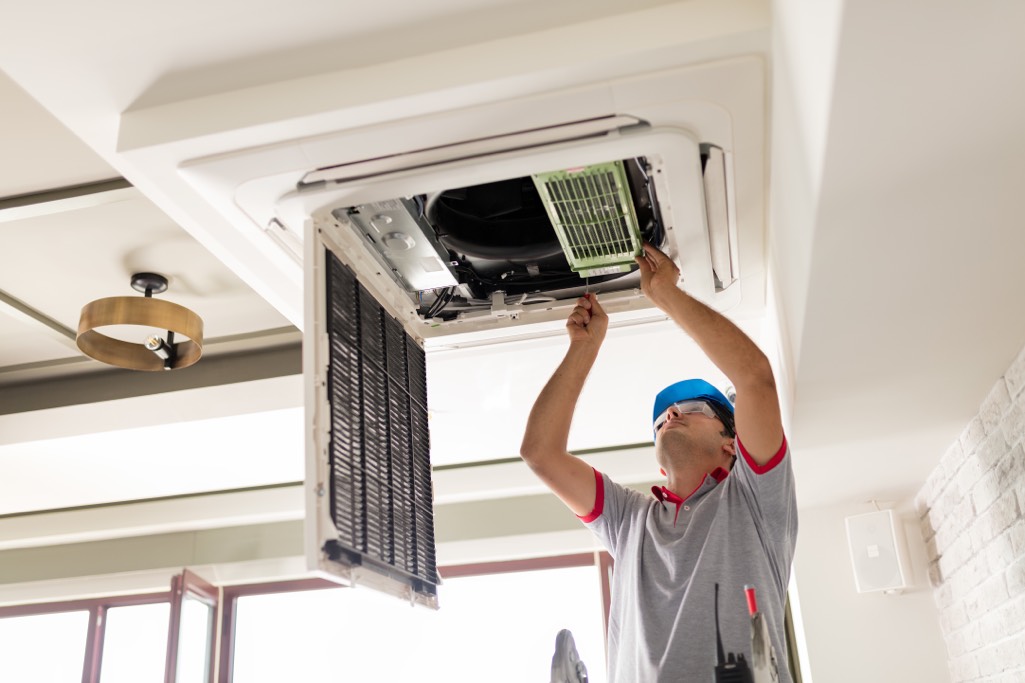Heat pumps and air conditioners work in very similar ways. A heat pump will take heat from outside your home and distribute it inside. An air conditioner will do the reverse, taking heat from inside and distributing it outside. Reversible heat pumps provide both hot air and cool air.
How does a heat pump system work?
At its simplest, a heat pump takes heat from the outside air around your home, compresses it and then redistributes it inside. Air source heat pumps take heat from the air outside your home, while ground source heat pumps take heat from the ground.
What types of heat pumps are there?
An air source heat pump comes in two types – air to air systems and air to water systems.
Air to air systems work a bit like air conditioning in reverse. But instead of a cooling system, they pump warm air into your home.
A ducted system works with a central system and requires a network of ducts throughout the home to output the warm air. A ductless heat pump does not require ducts but will only work with a single unit. Air-to-air systems can heat your house, but they will not heat your hot water. This will require a separate solution.
An air-to-water heat pump works differently. Like an air-to-air system, it takes heat energy from the air outside your home. However this heat is used to inside the home to heat hot water, just like a traditional heating system. This hot water can then be used to drive radiators and underfloor heating, as well as for showers and baths. This type of heat pump is more common in cold climates like the UK.
In the past, many householders have needed to make changes to older homes to get their heat pumps to work efficiently. These can include upgrades to insulation and radiators which can end up quite expensive. However, with a modern high-efficiency heat pump, these changes may no longer be required.
How does an air conditioning system work?
An air conditioning system works in a similar way. It also uses a compressed refrigerant to move heat. But instead of moving it from outside your home to indoor spaces, it takes heat from the inside air and displaces it outside.
Heat pump vs air conditioner – the big difference
There are a lot of similarities between an air to air heat pump system and an air conditioner. Both systems could be considered a type of air handler. And both systems require an outdoor unit and an indoor unit.
However, while an air conditioner fulfils a cooling function, it is no use for home heating.
On the other hand, many air to air heat pump systems have a reversing valve built in. They can be operated in both a cooling mode and a heating mode. This means that they can cool down your home in the summer months, as well as heat it in the colder months. We call these HVAC systems – which stands for heating, ventilation and air conditioning.
An important factor to understand is that while some air to air systems can also output cool air, an air to water system will not be able to do this. But an air to water system may be the right choice if you are replacing a natural gas boiler. You maybe be able to use your existing radiator system and you will not need a separate solution to heat your hot water. Check out our article on air source heat pump installation for more information.
Heat pump vs air conditioner – energy consumption
If you’re looking for energy-efficient heating – air-source heat pumps are a great choice. To understand how they can reduce your energy costs we need to introduce the Coefficient of Performance (CoP). CoP represents the efficiency of the device’s energy output. It is calculated by dividing the energy produced by the energy consumed.
This is a useful measure of one-time computational efficiency. However, for air source heat pumps, SCoP is a more accurate measure. This is also called the Seasonal Energy Efficiency Ratio, This takes into account temperature fluctuations to determine average efficiency throughout the year.
Air-to-air heat pumps have an SCoP of 3.5-5, which means they produce 3.5-5 times more energy than they use. This is very efficient, especially compared to the average CoP of 0.9 for conventional heating systems. This means that while a conventional heating system will only produce 90% of the energy used to run it, an air-to-air heat pump will produce 300%-500%.
The average SCoP of an air-to-water heat pump system is 2.5-4, which means it produces 2.5-4 times more energy than it uses. This value is lower than the SCoP of an air-to-air heat pump. But comparing the two SCoPs side by side is not a fair comparison. An air-to-air heat pump is unlikely to provide heating for an entire home. A home using a combination of air-to-air heating and a traditional boiler will have a much lower overall CoP than a home using only an air-to-water heat pump system.
The efficiency of air conditioners is expressed differently. We use something called the Energy Efficiency Ration (EER). It works in a similar way to the COP. If the air conditioner generates 5kW of cooling power for 1kW of electricity it would have an EER of 5.
To express this seasonally we use something called the Seasonal Coefficient of Performance (SEER). This is a measure of the air conditioner’s cooling capacity divided by the energy used (in watt-hours) during a typical cooling season. Essentially, SEER is a measure of how efficiently an air conditioner uses electricity to cool a home.
The higher the SEER rating, the more efficiently the system will cool your home. Most modern air conditioners have a SEER rating between 13 and 25, with a higher SEER rating indicating greater energy efficiency.
What is the best solution?
In moderate climates like the UK, while heating is essential, air conditioning is not. If home owners want to use less energy they could simply choose not to use air conditioning at all. Obviously if you live in a country with hot weather you may feel that air conditioning is a must have.
If you are looking for a system can produce heat and air conditioning in one unit, a reversible air to air heat pump is the obvious choice. This will supply heat in cold weather and cooled air in the warmer months. However, as mentioned above, you will need a supplemental heat source to heat your hot water. Typically, this will be a traditional gas boiler, or an electric water cylinder.
An air-to-water system is a great option for many households in the UK. It will provide heat during the winter and enough hot water for your household. The biggest difference between this type of system and an air-to-air heat pump is that an air-to-water system cannot provide cold air.
Of course, if you already have a traditional gas central heating system a better option may be to simply install a supplementary air conditioning unit in one or two rooms. Many people put a new air conditioner in the bedroom to provide cooler temperatures during the summer months.
Heat pump vs air conditioner – further reading
We hope this article has provided a good overview of heat pump vs air conditioner. For more information on the best heat pumps in the market we recommend reading our article on the best air source heat pumps. We also have a full guide on the funding available for heat pump installation in the UK.
For more information on the cost of an air source heat pump, please check out our article How much does an air source heat pump cost?

